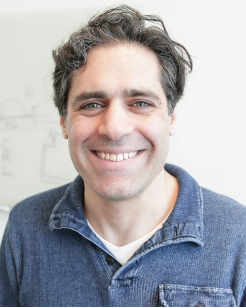Wireless Bioelectromagnetic Brain Sensors
7th September 2023
Timing : 1 pm EST
Please use this zoom link for joining the webinar
For a list of all talks at the NanoBio seminar Series Fall'23, see here
Dr. Aviad Hai
Assistant Professor
Department of Biomedical Engineering
Grainger Institute for Engineering &
Department of Electrical and Computer Engineering
University of Wisconsin-Madison
Dr. Aviad Hai is a neuroengineer and a neuroscientist whose group focuses on developing implantable and injectable agents for accessing the nervous system—towards achieving a broader understanding of brain function. Dr. Hai is the recipient of the 2020 NIH Director’s New Innovator award, the NIH NIBIB Mentored Research Scientist Development Award (K01), a long-term fellowship from the European Molecular Biology Organization (EMBO) and a fellowship from the Edmond & Lily Safra Center for Brain Sciences. In 2019, Dr. Hai joined the Department of Biomedical Engineering at the University of Wisconsin-Madison as an assistant professor, where his group is developing cutting edge electrical, magnetic, and electromagnetic sensors for large-scale recording and stimulation of brain activity. Dr. Hai received his Ph.D. from the Hebrew University of Jerusalem under the guidance of Prof. Micha Spira (Neurobiology) and Prof. Joseph Shappir (Electrical Engineering), where he pioneered nano-scale devices for multiplexed recording of neuronal intracellular signals. He later joined Prof. Alan Jasanoff at the department of Biological Engineering at the Massachusetts Institute of Technology, where he developed wireless implantable sensors that detect electromagnetic fields in the brain, and molecular technologies for direct imaging of neurotransmitter dynamics across large volumes of the brain. His efforts cohere with the goal of providing neuroscientists and neurologists with a complete toolbox for understanding and modulating electrical and neurochemical activity across the entire volume of the brain in parallel.
Assistant Professor
Department of Biomedical Engineering
Grainger Institute for Engineering &
Department of Electrical and Computer Engineering
University of Wisconsin-Madison
Dr. Aviad Hai is a neuroengineer and a neuroscientist whose group focuses on developing implantable and injectable agents for accessing the nervous system—towards achieving a broader understanding of brain function. Dr. Hai is the recipient of the 2020 NIH Director’s New Innovator award, the NIH NIBIB Mentored Research Scientist Development Award (K01), a long-term fellowship from the European Molecular Biology Organization (EMBO) and a fellowship from the Edmond & Lily Safra Center for Brain Sciences. In 2019, Dr. Hai joined the Department of Biomedical Engineering at the University of Wisconsin-Madison as an assistant professor, where his group is developing cutting edge electrical, magnetic, and electromagnetic sensors for large-scale recording and stimulation of brain activity. Dr. Hai received his Ph.D. from the Hebrew University of Jerusalem under the guidance of Prof. Micha Spira (Neurobiology) and Prof. Joseph Shappir (Electrical Engineering), where he pioneered nano-scale devices for multiplexed recording of neuronal intracellular signals. He later joined Prof. Alan Jasanoff at the department of Biological Engineering at the Massachusetts Institute of Technology, where he developed wireless implantable sensors that detect electromagnetic fields in the brain, and molecular technologies for direct imaging of neurotransmitter dynamics across large volumes of the brain. His efforts cohere with the goal of providing neuroscientists and neurologists with a complete toolbox for understanding and modulating electrical and neurochemical activity across the entire volume of the brain in parallel.
